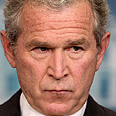
Bush - Will take the credit
צילום: AP
Bush recognizes opportunity
US hoping Iran will respond to combination of diplomacy, military threats
For years, the American Administration rejected out of hand any possibility of negotiations with Iran, the leading member of the “axis of evil.” Yet now, with only a few months left in office, President George W. Bush is suddenly changing course.
The indications for this change mostly include the decision to send a senior diplomat to attend the nuclear talks with Iran in Geneva this week, and the reports that the United States may open a diplomatic mission in Tehran for the first time since the 1979 Islamic revolution.
The American openness at this time comes against a backdrop of a growing threat of a military confrontation with Iran, backed up by reports of Israeli Air Force training sessions and missile tests by the Iranians.
Officials in the US have recently identified signs of Iranian pressure, including the doctored missile tests photographs and exaggerated threats of revenge, and they believe that this may mark an opportunity at this time to reach an agreement with Tehran on its military nuclear program. Any such agreement will focus on the demand to suspend the uranium enrichment.
In addition, for the first time since 2004, the American situation in Iraq has greatly improved, and some Iranian leaders are concerned about that.
All of the above prompted Bush and his Administration to decide to move closer to Iran. For Bush, McCain, and the Republican Party these diplomatic steps are also very important in terms of domestic US policy ahead of the elections.
Should the talks be successful and Iran would suspend its illegal aspirations for nuclear weapons, Bush will get all the credit. Should Iran continue to hold on to its rejectionist attitude, it will be easier for him to justify the military option and make it more difficult for the Democrats, including Obama, to object to this option.
Diplomacy and military threats are most effective when combined, and the Bush Administration now has several more months to examine the results of this approach.
Gerald Steinberg heads the Political Science Department at Bar-Ilan University and is a diplomacy and conflict management expert










